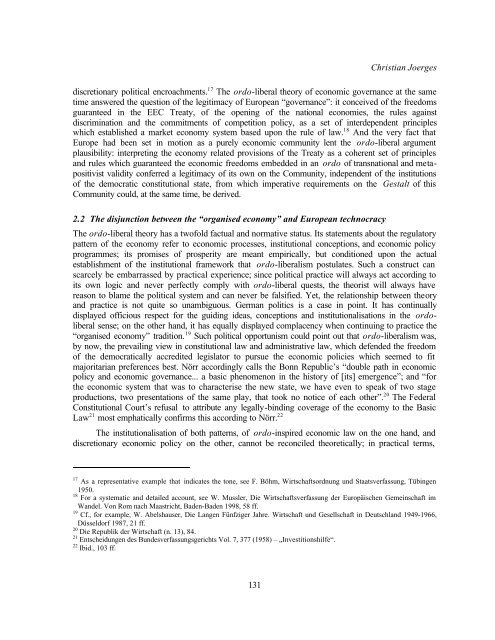Mountain or Molehill ?: - European University Institute
Mountain or Molehill ?: - European University Institute
Mountain or Molehill ?: - European University Institute
Create successful ePaper yourself
Turn your PDF publications into a flip-book with our unique Google optimized e-Paper software.
131<br />
Christian Joerges<br />
discretionary political encroachments. 17 The <strong>or</strong>do-liberal the<strong>or</strong>y of economic governance at the same<br />
time answered the question of the legitimacy of <strong>European</strong> “governance”: it conceived of the freedoms<br />
guaranteed in the EEC Treaty, of the opening of the national economies, the rules against<br />
discrimination and the commitments of competition policy, as a set of interdependent principles<br />
which established a market economy system based upon the rule of law. 18 And the very fact that<br />
Europe had been set in motion as a purely economic community lent the <strong>or</strong>do-liberal argument<br />
plausibility: interpreting the economy related provisions of the Treaty as a coherent set of principles<br />
and rules which guaranteed the economic freedoms embedded in an <strong>or</strong>do of transnational and metapositivist<br />
validity conferred a legitimacy of its own on the Community, independent of the institutions<br />
of the democratic constitutional state, from which imperative requirements on the Gestalt of this<br />
Community could, at the same time, be derived.<br />
2.2 The disjunction between the “<strong>or</strong>ganised economy” and <strong>European</strong> technocracy<br />
The <strong>or</strong>do-liberal the<strong>or</strong>y has a twofold factual and n<strong>or</strong>mative status. Its statements about the regulat<strong>or</strong>y<br />
pattern of the economy refer to economic processes, institutional conceptions, and economic policy<br />
programmes; its promises of prosperity are meant empirically, but conditioned upon the actual<br />
establishment of the institutional framew<strong>or</strong>k that <strong>or</strong>do-liberalism postulates. Such a construct can<br />
scarcely be embarrassed by practical experience; since political practice will always act acc<strong>or</strong>ding to<br />
its own logic and never perfectly comply with <strong>or</strong>do-liberal quests, the the<strong>or</strong>ist will always have<br />
reason to blame the political system and can never be falsified. Yet, the relationship between the<strong>or</strong>y<br />
and practice is not quite so unambiguous. German politics is a case in point. It has continually<br />
displayed officious respect f<strong>or</strong> the guiding ideas, conceptions and institutionalisations in the <strong>or</strong>doliberal<br />
sense; on the other hand, it has equally displayed complacency when continuing to practice the<br />
“<strong>or</strong>ganised economy” tradition. 19 Such political opp<strong>or</strong>tunism could point out that <strong>or</strong>do-liberalism was,<br />
by now, the prevailing view in constitutional law and administrative law, which defended the freedom<br />
of the democratically accredited legislat<strong>or</strong> to pursue the economic policies which seemed to fit<br />
maj<strong>or</strong>itarian preferences best. Nörr acc<strong>or</strong>dingly calls the Bonn Republic’s “double path in economic<br />
policy and economic governance... a basic phenomenon in the hist<strong>or</strong>y of [its] emergence”; and “f<strong>or</strong><br />
the economic system that was to characterise the new state, we have even to speak of two stage<br />
productions, two presentations of the same play, that took no notice of each other”. 20 The Federal<br />
Constitutional Court’s refusal to attribute any legally-binding coverage of the economy to the Basic<br />
Law 21 most emphatically confirms this acc<strong>or</strong>ding to Nörr. 22<br />
The institutionalisation of both patterns, of <strong>or</strong>do-inspired economic law on the one hand, and<br />
discretionary economic policy on the other, cannot be reconciled the<strong>or</strong>etically; in practical terms,<br />
17<br />
As a representative example that indicates the tone, see F. Böhm, Wirtschafts<strong>or</strong>dnung und Staatsverfassung, Tübingen<br />
1950.<br />
18<br />
F<strong>or</strong> a systematic and detailed account, see W. Mussler, Die Wirtschaftsverfassung der Europäischen Gemeinschaft im<br />
Wandel. Von Rom nach Maastricht, Baden-Baden 1998, 58 ff.<br />
19<br />
Cf., f<strong>or</strong> example, W. Abelshauser, Die Langen Fünfziger Jahre. Wirtschaft und Gesellschaft in Deutschland 1949-1966,<br />
Düsseld<strong>or</strong>f 1987, 21 ff.<br />
20<br />
Die Republik der Wirtschaft (n. 13), 84.<br />
21<br />
Entscheidungen des Bundesverfassungsgerichts Vol. 7, 377 (1958) – „Investitionshilfe“.<br />
22 Ibid., 103 ff.

















